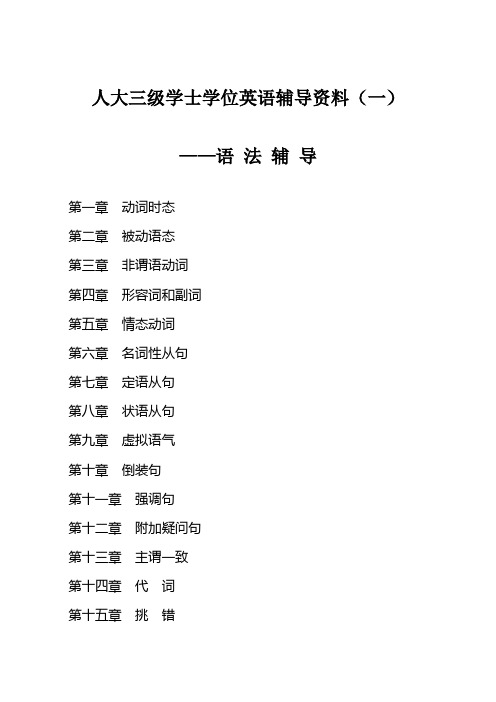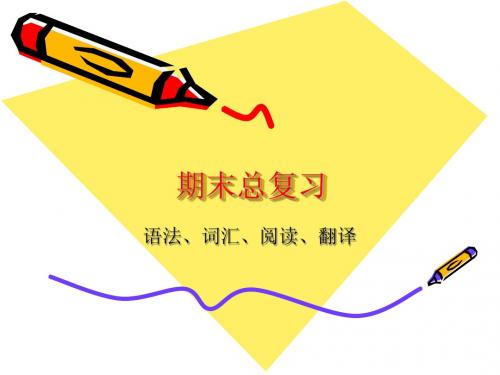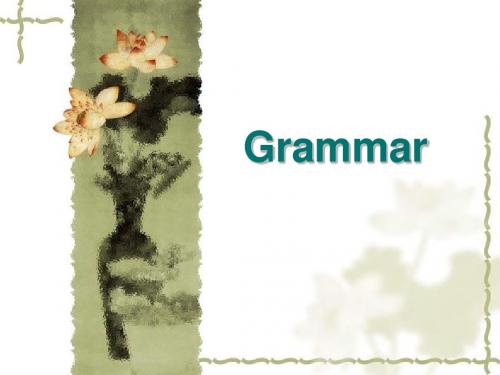大学英语三级考试语法总结(教学课件)
大学英语三级复习材料 ppt课件

cause 指造成某一事实或现象的直接原因,后接of sth./doing sth;
reason 用来解释某种现象或结果的理由,后接for sth./doing sth. 例:the reason for being late
PPT课件
6
易混淆词组复习
14. exercise, exercises, practice exercise 运动,锻炼(不可数); exercises 练习(可数); practice(反复做的)练习,例:Practice makes perfect.
the meeting. 他们建议所有的计划都应该在会上讨论。
PPT课件
16
浙江大学英语三级考试 虚拟语气细节讲解
常这样用的动词有:
ask 要求
advise 劝告
determine 决定 decide 决定
command 命令 insist 坚持
intend 打算
move 提议
prefer 宁愿
propose 提议
PPT课件
8
浙江大学英语三级考试 虚拟语气细节讲解
1. 主语从句中的虚拟语气 主语从句中的虚拟语气主要取决于某些形容词和过去分词,
用来表示建议、命令、要求、惊异和失望等。
其形式为:(should)+ 动词原形。
PPT课件
9
浙江大学英语三级考试 虚拟语气细节讲解
常这样用的形容词有: appropriate 适当的 advisable 适当的,合理的 better 较好的 desirable 理想的 essential 精华的 imperative 迫切的 important 重要的 insistent 坚持的 natural 自然的 necessary 必要的 preferable 优越的,较好的 strange 奇怪的 urgent 紧迫的 vital 极其重要的
英语三级语法考点归纳ppt课件

I have two sisters, who are both students. We were given a lovely double room, which had a sea view.
注: 引导限制性定语从句时,关系代词which可以与that 互换;但引导非限制性定语从句时,只能用which。
在整堂课的教学中,刘教师总是让学 生带着 问题来 学习, 而问题 的设置 具有一 定的梯 度,由 浅入深 ,所提 出的问 题也很 明确
2. 倒装结构
①“only+状语”位于句首(2015.12 T24) 如:Only in this way did I finish the homework.
②当not until…位于句首或者no sooner… than中no sooner… 位于句首时,位于句首时,其后的主句要用倒装语序 (2015.06 T25)(2013.12 T25)(2012.12 T19) 如:Not until the rain stopped did he leave the room.
在整堂课的教学中,刘教师总是让学 生带着 问题来 学习, 而问题 的设置 具有一 定的梯 度,由 浅入深 ,所提 出的问 题也很 明确
大学英语语法3形容词ppt课件

Adjectives
• An adjective is a word that modifies a noun or a pronoun by limiting its meaning. It tells a characteristic or quality of a noun or pronoun. Adjectives tell such things as which one? what kind? whose? how many/much?
Exercises 1: Combine the sentences in each set into a single clear sentence which represents
The comparative degree compares two nouns or pronouns: one holds a greater or lesser degree of a quality than the other.
Single syllable adj.: adj.-er Two-syllable adj.: more + adj (-ful/ -re). (more careful, more mature);
• Your story is interested. • My story is very interested. • Your story is not so interested as mine.
When we make a comparison of quantity, we use the structure “as + much/many n. + as” or “as + few/little n. + as”
大学英语三级考试教程ppt课件

文章连贯(Text Coherence)
♫Helicopters flying overhead made me uneasy. I had to constantly remind myself that these were most often civilian and not military helicopters. I had to remind myself that the ambulances were not rushing to evacuate wounded demonstrators.
anything about the subject? If so, what?
文章连贯(Text Coherence)
♫ 连贯意味段落中句子意思地连贯表 达。段落中句子或者在逻辑,或者 在语法上是彼此联系的。通常,一 个段落中所有的句子都应给予同样 的关注。
文章连贯(Text Coherence)
确认暗含意(indentifying the
implied idea)
♫ For example: direct marketing today occurs either in the form of a direct response, which requires a salesperson to complete the sale, or by direct order, which is a sale made without a personal saleis the selling of products without a shop, as with Avon. Com or Amway. Comproducts. Telemarketing, catalog shopping, personalized mailings, and trial offers are all ways to conduct direct marketing.
三级语法课件

人大三级学士学位英语辅导资料(一)——语法辅导第一章动词时态第二章被动语态第三章非谓语动词第四章形容词和副词第五章情态动词第六章名词性从句第七章定语从句第八章状语从句第九章虚拟语气第十章倒装句第十一章强调句第十二章附加疑问句第十三章主谓一致第十四章代词第十五章挑错第一章动词时态1. 一般现在时:在时间、条件状语从句中表示将来的动作用一般现在时:常用的连词有as soonas, when,till, if等。
e.g. When he comes back, he will go and see his cousin in hospital.If it rains tomorrow, the sports meet will be put off.The porter will wait till the train arrives.2. 一般过去时:used to do sth. be used to doing sth.e.g. The architect used to take the dog for a walk after supper when he lived here.Now he is used to browsing the newspapers in the evening.3. 一般将来时:表示将来的动作或状态。
a) will (shall) +原形动词:e.g. Peter will take robotics next semester.b) 某些表示开始、终结、往来行动的动词如:go ,come, start, arrive, leave等的现在进行时可表示将来。
e.g. The police are leaving for Brasilia tomorrow.The foreign guests are arriving in Jinan tonight by air.Are you going to attend the lecture tomorrow afternoon?c) be to +动词原形:表示安排或计划好了的动作。
英语三级知识点完整版.ppt

(4) 主语+as well as, along with, together with, including, accompanied by +名词 谓语动词与主语保持一致
(5) 名词前有each, every, many a 修饰时,谓语动词用 单数
In our country every boy and every girl has the right to receive education. (6) 就近原则 not only…but also, neither…nor, either…or…,谓语 与最邻近的主语一致。
课件
1) He is the driver_w_h_o_m_ I want to look for. 2) This is the friend _w_h_o_m__ I often visit. 3) I have a friend __w_h_o__ has much money. 4) It’s a thief __w__h_o__ was caught by us. 5) Kate is a student __w__h_o__ studies well. 6) This is the sportsman _w__h_o_ everyone says
(4) 从句中,反意疑问句和从句的谓语一致 I heard that you really had a wonderful time at John’s birthday party, didn’t you?
课件
Exercises:
1. His wife had the front door painted green
A
B
C
have a meeting to attend this evening.
新世纪大学英语三课文中常见基础语法点.ppt

考点10
使役动词的用法“让,使……”
• Let me think. (动词原形) • Make him cry. (动词原形) • Get him to do the cleaning. (不定式)
考点11 句首否定词,部分倒装
• Never have I met him. = I have never met him. • Not until yesterday did I finish the task. = I didn’t finish the task until yesterday. • Nowhere could I find my key. • Hardly have I caught the train.
考点6 主谓语数的一致
• The old enjoy quiet life. the+adj. 表群体,复数 Everything is changing. Elections take place every four years.
考点7 让步条件句的倒装结构
• Although/though / while he is still young, he performed the task very well. • Young as he is, he performed the task very well.
No matter…/wh-ever 无论
• No matter how hard I tried / however hard I tried, I failed again and again. • No matter what difficulties / whatever difficulties we met… • No matter how long we waited / however long we waited…
英语三级语法点总结

非真实条件句中谓语动词形式
条件从句 与现在事实相反 If sb.+过去式 (be的过去式是 were) 主句 sb.+ would (should, could, might)+动词原 形
与过去事实相反
sb.+ would (should, If sb.+ had done could, might) + have done
三虚拟语气的用法?虚拟语气用在非真实条件句中?虚拟语气用在宾语从句中?虚拟语气用在表语从句同位语从句中?虚拟语气用在主语从句中?wish和asifthough后的虚拟语气
Grammar
虚拟语气
一、虚拟语气的含义:用来表示说话人所说的话并不是 事实,而是一种假设、愿望、怀疑或推测。例如: If I had time, I would certainly go to the movie with you. I wish I were a white cloud. 二、虚拟语气通过谓语动词的特殊形式来表示。例如 If he were here, he would know what to do. If you had come a little earlier, you would have met her. She suggested that we should keep emailing each other.
虚拟语气用于主语从句
1. It be + 形容词 + that …(should)…. 用于该句型的形容词主要有:necessary, necessary important, good, right, wrong, natural, important proper, surprising 等。 natural funny, strange,strange
- 1、下载文档前请自行甄别文档内容的完整性,平台不提供额外的编辑、内容补充、找答案等附加服务。
- 2、"仅部分预览"的文档,不可在线预览部分如存在完整性等问题,可反馈申请退款(可完整预览的文档不适用该条件!)。
- 3、如文档侵犯您的权益,请联系客服反馈,我们会尽快为您处理(人工客服工作时间:9:00-18:30)。
练习题: 1. If he had taken the lawyer’s advice, he (save)
__________ himself a great deal of trouble.
2.He might have been killed in that car accident yesterday if he (take) __________ part in that activity with the team.
考点:
Be-型虚拟语气
2. 在表示命令、决定、建议等词语之后的 that-分句中,分句谓语动词用“should+动词 原形”或直接用动词原型。
(1)用在demand, insist(坚持), order, propose, recommend, request, require, suggest等动词之后的that-分句中。
A. fix
B. be fixed
C. have fixed D. have beenห้องสมุดไป่ตู้fixed
2. Jack must __________ (go) away---we can not find him anywhere in the factory.
3.Tom ______ the party as no one saw him there yesterday morning. A. can not attend 表示“严禁” B. mustn’t attend C. won’t have attended D. couldn’t have attended
( 2 ) 用 在 advisable ( 可 取 的 、 明 智 的 ) , desirable(称心合意的), essential(必要的、 必 不 可 少 的 ) , important, impossible, necessary, proper等形容词后的that-分句中。
( 3 ) 用 在 decision, demand, order, requirement(需要)等名词后的that-分句中。
考点: 4、其他特殊句式 (1)在It is (about/high) time +that定语从句 中需用虚拟语气,表示“该做……的时候了”,其 动词形式用一般过去时或should +动词原形。
练习题:
I think it is high time we _______ (take) strict measures to stop pollution.
3. __________ last Friday, he would have got to Paris. A. Would he leave B. Had he left C. If he is to leave D. If he was leaving 4. If I (be) ______ you, I would not miss the job interview tomorrow morning.
3. It is important that he (be) _______ called back immediately.
考点:
3. “情态动词+完成时态”的不同用法
(1)*should have done
表示“应当做某事(但是没有做)” shouldn’t have done sth 表示“本不应该做某事 (而做了)” (2)must have done 对过去时间里可能发生的事情的推测,表示
练习题:
1. The representative of the company demanded that part of the agreement ______ revised.
A. will be B. is C. to be D. be
2. It is suggested that the president of the Union (make) ______ a speech on behalf of all the workers.
“一定做了某事”。
否定形式是“couldn’t have done”
(3) needn’t have done sth 表示“本没必要做某事(却做了)”
(4) would like to have done sth 表示“本打算做某事(却没做)”
练习题:
1. This ATM has been out of service for a few days. It should __________ last week.
大学英语三级考试语法总结
• 语法考题的涉及面宽
• 近年考题出现频率最高的:几乎所有词类, 三种动词的非谓语形式,名词从句,形容 词从句,副词从句,独立主格,主谓一致, 倒装,强调,虚拟语气等基本语法知识。
• 语法考试的重点突出
• 语法考试的重点为内容庞杂较难掌握的项 目,这些项目有时还会反复出现如:虚拟 语气,状语从句,定语从句,独立主格, 情态动词。
1. 虚拟语气 2. 定语从句 3. 状语从句 4. 时态 5. 被动语态 6. 分词作状语 7. 分词作定语
8. 比较级和最高级 9. 先行词 it 10. 同位语 11. 倒装句 12. 强调句 13. 动词+ -ing/-to do 14. 词形转换 15. 词组
虚拟语气
概念:虚拟语气用来表示说话人的主观 愿望或假想,所说的是一个条件,不一 定是事实,或与事实相反。 考点:1. 由if引导的虚拟条件句
If 从句
主句
表示对现在情 过去式did (*be动词用 况的假设 were)
should/ would do
*表示对过去
情况的假设
had done
should/would/might/ could have done
• 注意点: 条件从句中省略if 采用倒装语序 的情况
• 在if引导的表示虚拟的条件状语从句中,有 时可以把含有助动词、情态动词、be或 have的虚拟条件句中的连词if 省去,而将 had ,should,were 等词提到主语之前, 即用倒装结构。
